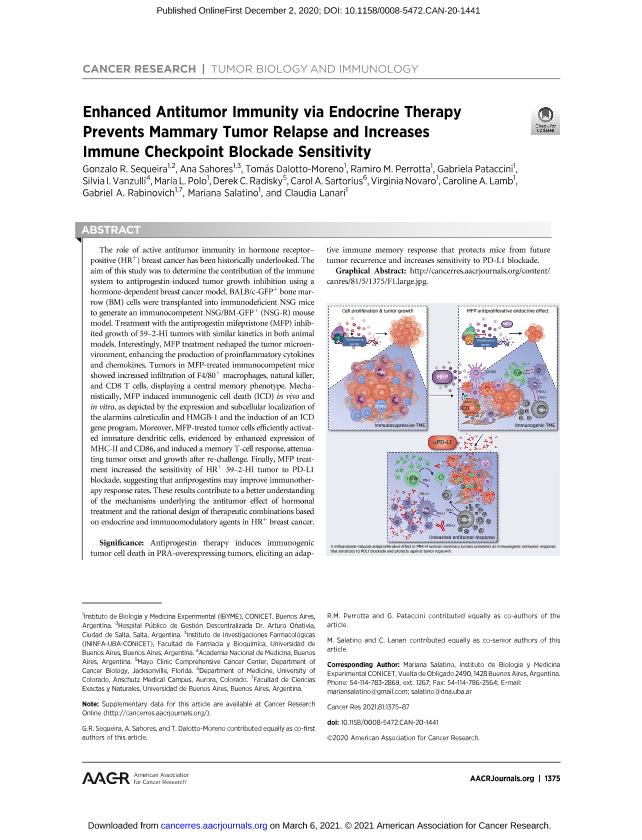Artículo
Enhanced antitumor immunity via endocrine therapy prevents mammary tumor relapse and increases immune checkpoint blockade sensitivity
Sequeira, Gonzalo Ricardo ; Sahores, Ana
; Sahores, Ana ; D'alotto Moreno, Tomas
; D'alotto Moreno, Tomas ; Perrotta, Ramiro Martin
; Perrotta, Ramiro Martin ; Pataccini, Gabriela
; Pataccini, Gabriela ; Vanzulli, Silvia; Polo, Maria Laura
; Vanzulli, Silvia; Polo, Maria Laura ; Weller, Derek J.; Sartorius, Carol A.; Novaro, Virginia
; Weller, Derek J.; Sartorius, Carol A.; Novaro, Virginia ; Lamb, Caroline Ana
; Lamb, Caroline Ana ; Rabinovich, Gabriel Adrián
; Rabinovich, Gabriel Adrián ; Salatino, Mariana
; Salatino, Mariana ; Lanari, Claudia Lee Malvina
; Lanari, Claudia Lee Malvina
 ; Sahores, Ana
; Sahores, Ana ; D'alotto Moreno, Tomas
; D'alotto Moreno, Tomas ; Perrotta, Ramiro Martin
; Perrotta, Ramiro Martin ; Pataccini, Gabriela
; Pataccini, Gabriela ; Vanzulli, Silvia; Polo, Maria Laura
; Vanzulli, Silvia; Polo, Maria Laura ; Weller, Derek J.; Sartorius, Carol A.; Novaro, Virginia
; Weller, Derek J.; Sartorius, Carol A.; Novaro, Virginia ; Lamb, Caroline Ana
; Lamb, Caroline Ana ; Rabinovich, Gabriel Adrián
; Rabinovich, Gabriel Adrián ; Salatino, Mariana
; Salatino, Mariana ; Lanari, Claudia Lee Malvina
; Lanari, Claudia Lee Malvina
Fecha de publicación:
03/2021
Editorial:
American Association for Cancer Research
Revista:
Cancer Research
ISSN:
0008-5472
Idioma:
Inglés
Tipo de recurso:
Artículo publicado
Clasificación temática:
Resumen
The role of active antitumor immunity in hormone receptor–positive (HR+) breast cancer has been historically underlooked. The aim of this study was to determine the contribution of the immune system to antiprogestin-induced tumor growth inhibition using a hormone-dependent breast cancer model. BALB/c-GFP+ bone marrow (BM) cells were transplanted into immunodeficient NSG mice to generate an immunocompetent NSG/BM-GFP+ (NSG-R) mouse model. Treatment with the antiprogestin mifepristone (MFP) inhibited growth of 59–2-HI tumors with similar kinetics in both animal models. Interestingly, MFP treatment reshaped the tumor microenvironment, enhancing the production of proinflammatory cytokines and chemokines. Tumors in MFP-treated immunocompetent mice showed increased infiltration of F4/80+ macrophages, natural killer, and CD8 T cells, displaying a central memory phenotype. Mechanistically, MFP induced immunogenic cell death (ICD) in vivo and in vitro, as depicted by the expression and subcellular localization of the alarmins calreticulin and HMGB-1 and the induction of an ICD gene program. Moreover, MFP-treated tumor cells efficiently activated immature dendritic cells, evidenced by enhanced expression of MHC-II and CD86, and induced a memory T-cell response, attenuating tumor onset and growth after re-challenge. Finally, MFP treatment increased the sensitivity of HR+ 59–2-HI tumor to PD-L1 blockade, suggesting that antiprogestins may improve immunotherapy response rates. These results contribute to a better understanding of the mechanisms underlying the antitumor effect of hormonal treatment and the rational design of therapeutic combinations based on endocrine and immunomodulatory agents in HR+ breast cancer.
Palabras clave:
BREAST CANCER
,
MIFEPRISTONE
,
IMMUNE SYSTEM
,
ENDOCRINE THERAPY
Archivos asociados
Licencia
Identificadores
Colecciones
Articulos(IBYME)
Articulos de INST.DE BIOLOGIA Y MEDICINA EXPERIMENTAL (I)
Articulos de INST.DE BIOLOGIA Y MEDICINA EXPERIMENTAL (I)
Articulos(INBIRS)
Articulos de INSTITUTO DE INVESTIGACIONES BIOMEDICAS EN RETROVIRUS Y SIDA
Articulos de INSTITUTO DE INVESTIGACIONES BIOMEDICAS EN RETROVIRUS Y SIDA
Citación
Sequeira, Gonzalo Ricardo; Sahores, Ana; D'alotto Moreno, Tomas; Perrotta, Ramiro Martin; Pataccini, Gabriela; et al.; Enhanced antitumor immunity via endocrine therapy prevents mammary tumor relapse and increases immune checkpoint blockade sensitivity; American Association for Cancer Research; Cancer Research; 81; 5; 3-2021; 1375-1387
Compartir
Altmétricas



